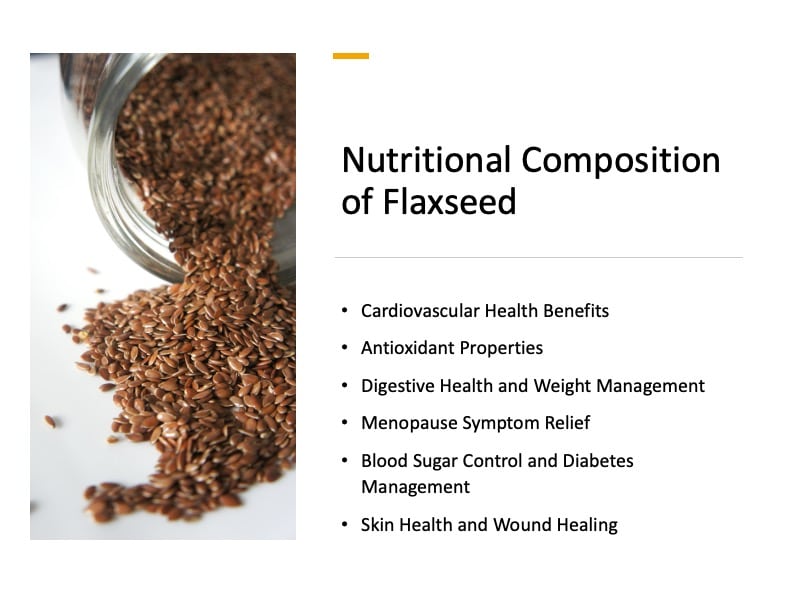Health Benefits of Flaxseeds: Is Flaxseed a Superfood?
Flaxseed, derived from the plant Linum usitatissimum, has been praised for its wide array of health benefits and dense nutritional profile, often earning the label of a “superfood.” Known for its high content of omega-3 fatty acids, lignans, and dietary fiber, flaxseed has gained popularity in the health and wellness community.
But what exactly makes flaxseed a superfood, and how can it improve your health? Let’s analyze the science behind this nutrient-packed seed.
Nutritional Composition of Flaxseeds

Flaxseed is a powerhouse of nutrients, rich in essential fatty acids, dietary fiber, and lignans—compounds that possess antioxidant properties.
According to a 2023 study published in Healthcare, flaxseed is particularly high in alpha-linolenic acid (ALA), a plant-based omega-3 fatty acid known for its anti-inflammatory effects (Nowak & Jeziorek, 2023).
In addition to ALA, flaxseed contains lignans, which act as phytoestrogens and antioxidants, and a significant amount of soluble and insoluble fiber, making it a highly functional food.
The fiber content in flaxseed not only supports digestive health but also helps regulate blood sugar levels and cholesterol.
Additionally, flaxseed is a good source of protein, B vitamins, and essential minerals such as magnesium and phosphorus. The combination of these nutrients makes flaxseed a versatile and valuable addition to any diet.
Cardiovascular Health Benefits
One of the most well-researched benefits of flaxseed is its positive impact on heart health. The high levels of ALA in flaxseed contribute to its anti-inflammatory properties, which can help lower the risk of cardiovascular diseases (CVD).
Regular consumption of flaxseed has been shown to improve lipid profiles by reducing total cholesterol, low-density lipoprotein (LDL), and triglyceride levels while simultaneously increasing high-density lipoprotein (HDL) cholesterol, often referred to as “good” cholesterol.
Flaxseed also contains lignans, which have been found to improve cardiovascular health by promoting healthy blood pressure levels and reducing arterial stiffness.
In a review of clinical studies, flaxseed consumption significantly lowered both systolic and diastolic blood pressure, which is a key factor in reducing the risk of heart disease (Parikh et al., 2019).
Antioxidant Properties
Flaxseed is a rich source of lignans, compounds with potent antioxidant properties that can help protect cells from oxidative stress. Oxidative stress occurs when free radicals, unstable molecules, cause damage to cells, leading to chronic diseases such as cancer.
Lignans in flaxseed act as phytoestrogens, mimicking estrogen in the body, which may reduce the risk of hormone-related cancers, including breast and prostate cancer.
Studies suggest that flaxseed may also play a role in colorectal cancer prevention.
A 2018 review published in Current Oncology Reports found that flaxseed lignans and dietary fiber have protective effects on the colon, reducing inflammation and supporting gut health, which can lower the risk of colorectal cancer (DeLuca et al., 2018).
Digestive Health and Weight Management
The high fiber content in flaxseed is one of its most well-known benefits, as both the soluble and insoluble fibers found in flaxseed support healthy digestion.
- Soluble fiber dissolves in water, forming a gel-like substance that helps to slow digestion and stabilize blood sugar levels.
- Insoluble fiber adds bulk to the stool, promoting regular bowel movements and preventing constipation.
Additionally, flaxseed serves as a source of prebiotics, which nourishes beneficial gut bacteria, further enhancing digestive health.
The fiber in flaxseed also promotes satiety, helping you feel full longer, which can aid in weight management.
Research consistently shows that incorporating flaxseed into meals can help reduce appetite and lower calorie intake, making it a helpful addition for those looking to lose or maintain weight.
Menopause Symptom Relief
Flaxseed may also offer benefits for women experiencing menopausal symptoms. Lignans in flaxseed act as phytoestrogens, which can help balance hormone levels and alleviate symptoms such as hot flashes, night sweats, and mood swings.
AThe2019 review published in Nutrients found that flaxseed supplementation significantly reduced the frequency and severity of hot flashes in menopausal women (Parikh et al., 2019).
Additionally, the anti-inflammatory and antioxidant properties of flaxseed may help combat oxidative stress and mental fatigue often associated with menopause.
Blood Sugar Control and Diabetes Management
Flaxseed’s high fiber content makes it an excellent food for managing blood sugar levels, particularly for individuals with type 2 diabetes. The soluble fiber in flaxseed slows the absorption of glucose into the bloodstream, helping to stabilize blood sugar levels after meals.
Studies have demonstrated that regular consumption of flaxseed can lower fasting blood glucose levels and improve insulin sensitivity, making it a valuable tool in diabetes management.
In addition to its blood sugar-regulating properties, flaxseed may also improve lipid profiles in people with type 2 diabetes.
The 2019 study in Nutrients found that flaxseed supplementation significantly lowered total cholesterol and LDL cholesterol in diabetic patients, reducing the risk of cardiovascular complications (Parikh et al., 2019).
Skin Health and Wound Healing
The anti-inflammatory properties of flaxseed extend beyond internal health, offering benefits for the skin as well.
Flaxseed oil, in particular, has been found to improve skin hydration, reduce skin irritation, and promote wound healing.
The ALA in flaxseed supports healthy skin cell function and may help alleviate conditions such as eczema and dermatitis.
Forms of Flaxseed and Bioavailability
Flaxseed is available in several forms, including whole flaxseed, ground flaxseed, flaxseed oil, and flax milk.
- Ground flaxseed is the most recommended form for consumption, as it ensures the bioavailability of the beneficial compounds, particularly ALA and lignans.
- Whole flaxseeds are difficult to digest, and their nutrients may pass through the digestive system without being absorbed.
- Flaxseed oil, while rich in ALA, lacks the lignans and fiber found in whole and ground flaxseed.
It is essential to store flaxseed products properly to preserve their nutrient content.
Flaxseed oil, in particular, is susceptible to oxidation, which can lead to rancidity.
Storing flaxseed oil in a cool, dark place and consuming it within a few weeks of opening can help maintain its freshness and health benefits.
Final Thoughts: Is Flaxseed a Superfood?
Substantial research supports flaxseed’s health benefits, making it undoubtedly a superfood. Its high content of omega-3 fatty acids, lignans, and fiber offers a wide range of health benefits, from cardiovascular protection to improved digestive health and cancer prevention.
Whether you are looking to improve your heart health, manage your weight, or alleviate menopausal symptoms, flaxseed is a versatile and nutrient-rich food that can enhance your overall well-being.
Read Next: Flaxseed vs Chia Seeds: Which Are Healthier?
This website does not provide medical advice. This website site does contain affiliate links, and purchases may earn a commission.
Read my Medical Disclaimer, Review Disclaimer, and Publishing Policies for more details. Use of this site indicates acceptance of these terms.



